Supplements to Keep Calm During Traffic Jams
Introduction
Few things test your patience quite like being stuck in traffic. The slow crawl, the endless honking, the red lights — it can turn even the most centered person into a bundle of nerves. Whether you’re commuting to work or sitting in gridlock on a road trip, traffic jams are a modern form of stress exposure that hits both the body and the brain.
Your heart rate climbs, cortisol rises, and your thoughts spiral: Why did I take this route? I’m going to be late. This always happens to me.
While mindfulness and breathing techniques are powerful tools for staying calm, nutritional support can make a surprising difference. Certain supplements can strengthen your stress resilience, balance neurotransmitters, and regulate the nervous system so that even when you can’t control traffic — you can control your reaction to it.
This article explores how chronic stress affects your body behind the wheel and how specific nutrients, adaptogens, and amino acids can help you stay calm, patient, and focused when everyone else is losing their cool 🌿.
Looking for supplements for This? Click here.
The Biology of Road Rage 🧠

When you’re stuck in traffic, your body interprets the situation as a threat. Even though there’s no real danger, your nervous system doesn’t know that. The frustration, noise, and unpredictability of traffic activate your amygdala — the brain’s alarm system — which then triggers the sympathetic nervous system, or the “fight or flight” response.
Heart rate increases, blood pressure rises, and cortisol floods your bloodstream. Your muscles tense as if preparing for action, but because you can’t actually “fight” the traffic, that energy gets trapped — resulting in irritability, anxiety, or fatigue once you finally reach your destination.
Over time, these micro-stressors can accumulate. If you commute daily, you might notice symptoms of chronic stress overload: headaches, poor sleep, mood swings, digestive discomfort, or feeling constantly “on edge.”
To stay calm in traffic, you don’t just need willpower — you need biochemical support for your adrenal glands, neurotransmitters, and vagus nerve (the main nerve responsible for relaxation).
How Supplements Can Help 🌿
Supplements work by supporting your neurochemical balance and stress-response systems. Some calm the nervous system by enhancing GABA (a relaxing neurotransmitter), while others lower cortisol or increase resilience through adaptogenic effects.
These aren’t quick fixes or sedatives — they work subtly over time to strengthen your baseline calm. That way, the next time you’re caught in rush-hour chaos, your body doesn’t go straight into overdrive.
Let’s look at the key categories of supplements that can help you stay cool behind the wheel.
Magnesium: The Ultimate Calming Mineral 🧘
Magnesium is often called “nature’s tranquilizer” — and for good reason. It’s essential for over 300 enzymatic reactions in the body, many of which regulate the nervous system.
When stress hits, your body uses up magnesium rapidly. Low magnesium can increase anxiety, muscle tension, and irritability — exactly the symptoms that flare during traffic.
Supplementing with magnesium glycinate or magnesium threonate can help calm your nerves without making you drowsy. These forms cross the blood–brain barrier and support GABA receptors, promoting a deep sense of relaxation and patience.
Think of magnesium as your nervous system’s brake pedal — it helps you slow down, breathe, and respond calmly rather than react impulsively.
L-Theanine: Calm Alertness in a Capsule 🍵
If you’ve ever felt peaceful after a cup of green tea, you can thank L-theanine, an amino acid that promotes relaxation without sedation.
L-theanine increases alpha brain waves, the same waves produced during meditation or mindful breathing. This state is associated with calm focus — ideal for driving.
It also balances levels of dopamine and serotonin, helping you stay emotionally steady even when the car in front of you cuts you off for the third time.
Studies show that L-theanine can reduce heart rate and stress responses during challenging situations, making it perfect for anyone prone to road rage or anxious driving.
Take 100–200 mg before long drives or combine it with green tea for a natural mood lift and smoother concentration.
Ashwagandha: The Adaptogen That Builds Stress Resilience 🌿
Ashwagandha is one of the most researched adaptogens — herbs that help your body adapt to stress.
When you face daily traffic, your stress hormones (particularly cortisol) stay elevated longer than they should. Over time, this can exhaust your adrenals and make you more reactive.
Ashwagandha helps normalize cortisol levels, improve focus, and reduce anxiety without dulling your alertness — a key advantage when driving.
Regular use enhances overall stress tolerance, meaning you won’t just feel calmer in traffic, but in other high-pressure moments too.
A typical dose ranges from 300 to 600 mg of standardized extract per day.
Rhodiola Rosea: Energy and Emotional Stability 🚀
If long commutes leave you drained or irritable, Rhodiola rosea might be your ally.
This adaptogen balances neurotransmitters like serotonin and dopamine while improving oxygen use in the brain. The result is calm alertness — not the jittery energy of caffeine, but smooth focus and endurance.
Rhodiola also reduces fatigue caused by stress and helps maintain emotional stability during repetitive, frustrating conditions — like sitting bumper to bumper on a Friday evening.
It’s ideal for people who tend to shut down or zone out when overwhelmed, since it helps sustain motivation and cognitive function even under stress.
Looking for supplements for This? Click here.
GABA and PharmaGABA: The Relaxation Neurotransmitters 🌙
GABA (gamma-aminobutyric acid) is the brain’s primary inhibitory neurotransmitter — in other words, it’s what helps you relax.
When GABA levels are low, your mind races, your muscles tense, and you feel “wired but tired.” GABA supplements (especially natural forms like PharmaGABA) support calmness, slow breathing, and muscle release.
For drivers who get easily agitated or anxious behind the wheel, GABA can make stressful commutes feel smoother and less emotionally charged.
Some people prefer to pair GABA with L-theanine for synergistic calm — a combination shown to reduce stress markers while maintaining mental clarity.
B Vitamins: Energy Without Edginess ⚡
The B-complex vitamins — particularly B6, B9 (folate), and B12 — are essential for neurotransmitter synthesis and energy metabolism.
Chronic stress depletes these vitamins, leading to fatigue, irritability, and poor concentration.
Supplementing with a balanced B-complex can help regulate mood and support the nervous system. They also play a key role in methylation, a biochemical process that affects dopamine, serotonin, and adrenaline balance.
When these pathways function smoothly, it’s easier to stay grounded, focused, and emotionally steady in challenging environments.
Omega-3 Fatty Acids: Fluid Thinking and Emotional Control 🐟
Omega-3s (EPA and DHA) strengthen brain cell membranes, improve neurotransmitter flow, and reduce inflammation — all of which enhance emotional regulation.
Research shows that people with higher omega-3 levels tend to be more emotionally balanced and less prone to impulsive reactions.
For drivers, omega-3s support clear thinking, faster decision-making, and patience — even during frustrating delays.
Take 1000–2000 mg of combined EPA and DHA daily from fish oil or algae-based supplements.
Lemon Balm and Chamomile: Nature’s Gentle Soothers 🌼
If your nerves feel frazzled after a long day of commuting, lemon balm (Melissa officinalis) and chamomile can provide gentle, natural calm.
Both herbs promote GABA activity, reduce restlessness, and ease physical tension. Unlike sedatives, they don’t impair alertness, making them safe for use before driving.
They can be enjoyed as teas, tinctures, or capsules — a simple ritual before leaving home to set a calm tone for your day.
Adaptogenic Blends: The Long-Term Solution 🌱
Instead of taking single herbs, some people prefer adaptogenic blends — combinations of herbs like ashwagandha, rhodiola, holy basil, and schisandra.
These blends support both mental calm and physical energy, strengthening your body’s stress resilience over time.
Adaptogens don’t just help you handle one traffic jam; they recondition your nervous system to handle all forms of modern stress more gracefully.
You might notice that after a few weeks, you don’t react as strongly to delays or slow drivers — your body learns to stay in equilibrium.
The Breath–Supplement Connection 🌬️
While supplements provide biochemical support, pairing them with conscious breathing multiplies their effects.
When you slow your breathing to 5–6 breaths per minute, you activate your vagus nerve, lowering heart rate and cortisol. This state enhances the absorption and utilization of calming nutrients like magnesium and theanine.
Try this next time you’re stuck at a red light: inhale through your nose for 4 seconds, exhale slowly for 6. Feel the shoulders drop and the heart rate steady.
Your supplements help regulate your brain chemistry; your breath tells your body, I’m safe right now. Together, they create calm from the inside out.
Want to try Breathwork? Click Here.
Creating a “Calm Commute Stack” 🚗🌿
While every person’s needs are different, a simple calming routine for drivers might look like this:
Morning (before the commute): L-theanine + magnesium + B-complex
Afternoon (during long drives): Rhodiola or ashwagandha for stress resilience
Evening (after arriving home): Chamomile tea or lemon balm for recovery
This approach combines acute calming (for moments of stress) with long-term adaptation (for resilience over time).
The goal isn’t to block stress completely but to buffer it — to stay in control when circumstances aren’t.
Mind–Body Practices That Complement Supplements 🧘
Supplements work best when paired with mindful awareness. Here are some practices that amplify their benefits:
Mindful driving: Instead of focusing on the destination, bring attention to the sensations of driving — your hands on the wheel, the rhythm of the breath, the feeling of your seat.
Audiobooks or calming playlists: Engaging the brain with soft stimulation can shift attention away from frustration. Try instrumental music or audiobooks that keep your mind pleasantly occupied.
Gratitude practice: Each red light is a chance to slow down — not just physically, but mentally. Taking a moment to breathe and express gratitude (for safety, for time to think) rewires the brain toward calm.
Progressive muscle relaxation: When you notice tension, consciously relax the jaw, shoulders, and grip on the steering wheel. These micro-relaxations prevent your nervous system from escalating.
These small habits create a biological and psychological feedback loop of calm.
The Science of Staying Calm on the Road 🧠✨
Multiple studies show that even brief exposure to traffic stress raises cortisol and blood pressure. However, people with stronger antioxidant defenses and balanced neurotransmitters recover faster.
Magnesium, L-theanine, and omega-3 fatty acids, in particular, have been shown to reduce sympathetic activation and enhance parasympathetic tone — meaning your body returns to balance more quickly after stress.
Over time, these nutrients don’t just help you survive traffic; they help retrain your stress response. Your brain learns that being late or delayed isn’t life-threatening. The amygdala quiets, and the prefrontal cortex — your logical, patient self — stays in control.
That’s the real power of supplementation: it supports the biology of calm.
What to Avoid Before Driving ⚠️
While some supplements support calm focus, others can impair alertness or cause drowsiness. Avoid taking heavy sedatives, high doses of melatonin, or strong herbal sleep aids like valerian before driving.
Also, stay hydrated — dehydration amplifies stress hormone production and reduces focus. Keep water in your car alongside your calm-support supplements.
A Note on Consistency 🌿
The benefits of calming supplements build with consistent use. While magnesium or L-theanine may work within hours, adaptogens like ashwagandha or rhodiola take weeks to show their full effect.
The goal is not sedation but resilience — the ability to remain relaxed, alert, and adaptable in any situation.
That way, even when you’re surrounded by impatient drivers, your body remembers: I can breathe through this. I’m in control.
From Road Rage to Road Zen 🧘
Imagine sitting in a traffic jam — the lights are red, horns are blaring, and yet, your breathing stays steady. Your shoulders are relaxed, your mind alert but calm. You might even turn on a podcast, sip your tea, and smile.
That’s what biochemical calm feels like: not forced positivity, but genuine nervous system balance.
With the right combination of nutrients, adaptogens, and mindfulness, you can transform your daily commute into a ritual of grounded patience.
Traffic might be inevitable — but panic and frustration don’t have to be.
Looking for online therapy ? Click Here.
References
Kennedy, D. O. (2016). “Cognitive nutrition and stress modulation.” Frontiers in Neuroscience, 10: 23.
Panossian, A., & Wikman, G. (2010). “Effects of adaptogens on the central nervous system.” Phytomedicine, 17(6): 481–493.
Kimura, K., et al. (2007). “L-theanine reduces psychological and physiological stress.” Biological Psychology, 74(1): 39–45.
Boyle, N. B., et al. (2017). “The role of magnesium in stress regulation.” Nutrients, 9(5): 429.
Cropley, M., et al. (2012). “Mindfulness, commuting, and stress recovery.” Transportation Research Part F, 15(1): 59–68.
Reay, J. L., et al. (2006). “Rhodiola rosea and mental performance under stress.” Phytotherapy Research, 20(8): 665–672.
Lopresti, A. L., et al. (2019). “Ashwagandha and stress adaptation.” Medicine (Baltimore), 98(37): e17186.
Benton, D., (2010). “B vitamins and mental performance.” Nutrition Reviews, 68(10): 585–601.
Higdon, J., (2018). The Antioxidant Nutrients: Vitamin C, E, and Beta-Carotene. Oregon State University Micronutrient Center.
Lanius, R. A., et al. (2018). The Neurobiology of Stress and Emotional Regulation. Routledge.
Related Posts
-

Why Co-Dependency Feels Draining: Adrenal Fatigue and Supplements That Help
The adrenal glands are small but powerful organs that sit above your kidneys, acting as your body’s built-in stress managers. They produce hormones like cortisol and adrenaline that help regulate energy, mood, and resilience. When they’re overworked from chronic stress or emotional exhaustion, fatigue and imbalance follow. Supporting adrenal health naturally can help restore calm, energy, and hormonal balance. 🌿⚡
-

The Link Between Anxiety, Co-Dependency, and Natural Support
Anxiety feels like living in constant alert mode—your heart races, your thoughts loop, and your body can’t find peace. It’s the nervous system’s way of preparing for danger, even when none exists. Understanding what’s happening in your mind and body is the first step toward calming the storm and restoring balance. 🌿💫
-

Supplements That Support Dopamine and Serotonin in Co-Dependent Patterns
Serotonin is the neurotransmitter of calm, confidence, and contentment. When it’s balanced, you feel peaceful and emotionally grounded. When it’s low, anxiety, mood swings, and emotional dependence take over. By understanding serotonin’s role in emotional health—and how to support it naturally—you can rebuild inner stability, improve relationships, and cultivate lasting happiness from within. 🌞💫
-

How Emotional Exhaustion in Codependency Impacts the Nervous System
The nervous system is the body’s communication network, connecting the brain to every organ and muscle. It regulates stress, mood, and emotion through a delicate balance of electrical and chemical signals. When overwhelmed, it can become dysregulated—leading to fatigue, anxiety, and emotional imbalance. Understanding how to calm and strengthen the nervous system is key to healing from chronic stress and emotional burnout. ⚡🌿
-

What Is Co-Dependency? The Role of Brain Chemistry and Stress
Stress is more than a feeling—it’s a full-body experience that begins in the brain and ripples through every cell. When cortisol surges and the nervous system stays on alert, your body can’t rest or recover. Over time, this constant tension affects energy, focus, mood, and even immune health. Understanding stress chemistry is the first step toward breaking free from burnout and finding calm again. 🌿
-

Creating a Supplement Stack for Motivation, Energy, and Anti-Procrastination
Motivation is the fuel behind every meaningful achievement—but it’s not just about willpower. It’s a mix of mindset, brain chemistry, and momentum. When energy, focus, and purpose align, action feels natural instead of forced. Learn how to harness motivation as a daily state, not a fleeting feeling.
-

Supplements for Building Consistency and Reducing Chronic Procrastination
Biochemistry is the bridge between biology and chemistry—the science of life at the molecular level. It explains how nutrients, hormones, and neurotransmitters interact to create energy, thought, and emotion. From brain function to muscle movement, biochemistry reveals the invisible processes that sustain health, balance, and vitality.
-

GABA and Procrastination: Supporting Calm Focus for Productivity
GABA is the brain’s natural calming messenger—a neurotransmitter that helps slow mental overactivity and ease stress. When GABA levels drop, focus fades, anxiety rises, and procrastination becomes more likely. By supporting GABA through nutrition, lifestyle, and supplements, you can restore calm clarity, improve focus, and take action with steady, balanced energy.
-

Ashwagandha and Procrastination: Lowering Stress to Improve Action
Science is the language of curiosity and discovery. It helps us understand the hidden patterns behind life, energy, and the universe. Through experimentation and critical thinking, science connects imagination to evidence—turning questions into knowledge. Whether through microscopes, molecules, or minds at work, science represents our endless pursuit of truth and innovation.
-

Neurotransmitters and Motivation: Supplements That Support Drive and Focus
Supplements can do more than boost physical health—they can also enhance mental clarity, focus, and motivation. Nutrients like omega-3s, magnesium, B vitamins, and adaptogens help balance neurotransmitters, stabilize mood, and support brain energy. When combined with good sleep, nutrition, and mindful habits, they can transform how your brain performs under stress.
-

How Stress Hormones Like Cortisol Fuel Procrastination (and What Helps)
Blood sugar isn’t just about physical health—it directly impacts focus, mood, and motivation. When glucose levels spike and crash, energy and attention do the same, fueling procrastination and brain fog. Learning how to stabilize blood sugar through balanced meals, mindful habits, and key nutrients helps keep your mind steady, focused, and ready to act.
-

Brain Fog and Procrastination: Supplements for Mental Clarity
Brain fog can turn even simple tasks into mental hurdles. When your thoughts feel slow and unclear, procrastination often follows—making focus and productivity seem impossible. This article explores the biochemical and lifestyle causes of brain fog and reveals the most effective supplements for restoring mental clarity, focus, and sustained energy.
-

The Link Between Low Energy and Procrastination: Can Supplements Help?
Neurochemistry shapes how we think, feel, and act. When neurotransmitters like dopamine, serotonin, and GABA fall out of balance, it can lead to fatigue, anxiety, or lack of motivation—fueling procrastination and low mood. Understanding the brain’s chemical communication system helps us find ways to restore focus, calm, and emotional stability through nutrition, mindfulness, and targeted supplements.
-

Why Do We Procrastinate? The Role of Dopamine and Supplements That Support It
Dopamine is the brain’s motivation messenger—the chemical that fuels focus, reward, and drive. When dopamine levels drop, even simple tasks can feel impossible to start. This article explores how dopamine shapes procrastination, motivation, and mental energy, along with natural supplements and daily habits that help restore balance and get things done.
-

Phosphatidylserine and Stress Reduction for People with BDD
Stress is more than a mental state—it’s a full-body experience that affects hormones, brain chemistry, and emotional balance. For people with Body Dysmorphic Disorder (BDD), constant tension and worry about appearance can overload the nervous system. Learning how stress works and finding ways to calm it is key to breaking the cycle of anxiety and self-criticism.
-

How Antioxidants Like Vitamin C & E Support Mental Health in BDD
Antioxidants are the body’s natural defense against stress and inflammation. For people with Body Dysmorphic Disorder (BDD), oxidative stress can worsen fatigue, anxiety, and emotional imbalance. Nutrients like Vitamin C and E help protect brain cells, boost neurotransmitter function, and support a calmer, clearer mindset—building a stronger foundation for recovery.
-

Ginkgo Biloba and Memory Support for BDD Recovery
Emotional regulation is the foundation of healing from Body Dysmorphic Disorder (BDD). When the nervous system stays in constant overdrive, even small stressors can trigger self-critical spirals. Learning to calm emotional reactivity helps restore clarity, confidence, and a sense of inner balance. By blending mindfulness, nervous system support, and self-compassion, you can retrain your brain to respond—not react—to emotion.
-

Alpha GPC and Cognitive Function in Body Dysmorphic Disorder
Mental fatigue can feel like your brain has hit a wall—thoughts slow down, focus fades, and motivation disappears. For people with Body Dysmorphic Disorder (BDD), chronic overthinking, emotional stress, and constant self-evaluation can deplete mental energy even further. Understanding what causes this cognitive exhaustion is the first step toward recovery—through rest, balanced nutrition, and targeted brain-supporting supplements.
-

N-Acetyl L-Tyrosine and BDD: Supporting Mental Clarity
Chronic stress doesn’t just affect your mood—it reshapes your brain chemistry, weakens focus, and fuels the obsessive thought loops common in Body Dysmorphic Disorder (BDD). Over time, constant cortisol elevation drains mental energy and emotional balance. Learning to recognize and manage chronic stress is essential to restoring mental clarity, self-compassion, and resilience.
-

Chamomile and Lavender for Calming Obsessive Body Image Thoughts
The nervous system is the command center of our emotional and physical world—and in Body Dysmorphic Disorder (BDD), it often operates in overdrive. Understanding how the brain and body communicate under stress reveals why intrusive thoughts feel uncontrollable. Learning to regulate the nervous system through calm practices, nutrition, and supplements helps restore inner balance and emotional safety.
-

Adaptogens for Body Dysmorphic Disorder: Rhodiola, Ginseng, and More
Rhodiola rosea, often called the “golden root,” is an adaptogenic herb renowned for boosting stress resilience and mental endurance. For individuals with Body Dysmorphic Disorder (BDD), Rhodiola may help reduce fatigue, regulate cortisol, and enhance emotional balance. By supporting both mind and body, this powerful plant promotes calm focus, improved mood, and renewed energy to face daily challenges.
-

B Vitamins for Stress Resilience in BDD: Rebuilding Calm from Within
Biochemistry is at the heart of every thought, emotion, and reaction we experience. In Body Dysmorphic Disorder (BDD), chemical imbalances in neurotransmitters like serotonin, dopamine, and GABA can amplify stress and distort self-perception. Understanding the biochemistry behind mood and stress regulation offers a path toward healing—bridging the gap between emotional experience and the body’s molecular balance.
-

Melatonin and Body Dysmorphic Disorder: Restoring Healthy Sleep Patterns
Melatonin, the body’s natural sleep hormone, plays a vital role in helping people with Body Dysmorphic Disorder (BDD) restore healthy sleep cycles. When anxiety and obsessive thinking interfere with rest, melatonin levels often drop, leading to more emotional reactivity and distorted self-perception. This article explores how melatonin works, why BDD disrupts it, and how natural supplementation—combined with mindful routines—can help the brain and body finally find calm at night.
-

Sleep Struggles with BDD: Supplements for Rest and Recovery
When you’re living with Body Dysmorphic Disorder (BDD), restful sleep can feel impossible—but the right supplements can help reset your body’s natural rhythm. From magnesium and L-theanine to 5-HTP and ashwagandha, these nutrients support relaxation, lower cortisol, and enhance melatonin production. This article explores how supplements can calm the mind, ease nighttime anxiety, and promote true restorative sleep for emotional and physical recovery.
-

5-HTP and Serotonin Balance: Could It Help with Body Dysmorphic Disorder?
Anxiety can feel like a storm inside the mind—restless, overwhelming, and hard to control. In people with Body Dysmorphic Disorder (BDD), anxiety often fuels obsessive thoughts and self-criticism, creating a painful cycle of worry and self-doubt. This article explores the biological roots of anxiety, the role of neurotransmitters like serotonin and GABA, and how natural strategies such as mindfulness, supplements, and nervous system regulation can restore calm and mental clarity.
-

Can Ashwagandha Help Ease Stress and Anxiety in Body Dysmorphic Disorder?
Neurotransmitters like serotonin, dopamine, GABA, and acetylcholine are the chemical messengers that shape how we think, feel, and react to stress. In Body Dysmorphic Disorder (BDD), imbalances in these neurotransmitters can amplify anxiety, obsessive thinking, and emotional distress. This article explores how restoring healthy brain chemistry through nutrition, supplements, and mindfulness can help bring clarity, calm, and emotional stability.
-

L-Theanine for BDD: Finding Calm in the Mind
Neurochemistry plays a central role in how we think, feel, and see ourselves. For those living with Body Dysmorphic Disorder (BDD), imbalances in neurotransmitters like serotonin, dopamine, and GABA can intensify anxiety, obsessive thoughts, and emotional distress. This article explores how regulating brain chemistry through supplements, mindfulness, and lifestyle changes can bring the nervous system back into harmony and restore inner calm.
-

Omega-3 Fatty Acids and Body Image Disorders: Supporting Emotional Health
Omega-3 fatty acids do far more than support heart health—they nourish the brain, stabilize mood, and may ease the emotional turbulence tied to body image disorders like BDD. This in-depth article explores how omega-3s regulate serotonin, dopamine, and inflammation, helping individuals reduce obsessive thoughts and rebuild self-acceptance. It also connects nutrition to therapy, mindfulness, and nervous system balance for holistic emotional healing.
-

Magnesium and BDD: Calming an Overactive Nervous System
Magnesium plays a crucial role in calming an overactive nervous system—something people with Body Dysmorphic Disorder (BDD) struggle with daily. This article explores how magnesium supports relaxation, emotional regulation, and stress reduction while diving into the science behind its connection to brain chemistry. It also examines how combining magnesium supplementation with therapy and breathwork can help rebalance the body’s stress response, reduce obsessive thought patterns, and promote lasting nervous system calm.
-

The Gut-Brain Axis and BDD: Why Probiotics Might Matter
The gut and brain are constantly in conversation — and that dialogue may shape how you experience Body Dysmorphic Disorder. By nurturing your microbiome with probiotics, prebiotics, and gut-healing nutrients, you can help rebalance serotonin, calm anxiety, and restore emotional stability from within 🧠🦠.
-
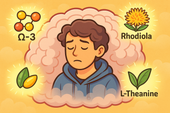
Brain Fog and Body Dysmorphic Disorder: Can Nootropic Supplements Help?
Brain fog often accompanies Body Dysmorphic Disorder, clouding focus and deepening emotional fatigue. Nootropic supplements like L-theanine, Rhodiola, and CoQ10 can help restore mental clarity, balance neurotransmitters, and bring calm energy back to the mind 🌿🧠.
-

How Stress Hormones Like Cortisol May Worsen Body Dysmorphic Disorder
Chronic stress floods the brain with cortisol — the hormone that keeps you on high alert. In Body Dysmorphic Disorder, this chemical overdrive fuels anxiety, distorts self-image, and traps the body in survival mode. Calming cortisol helps restore both peace and perspective 🌿🧠.
-

The Role of Neurotransmitters in BDD—and How Supplements May Help
Neurotransmitters like serotonin, dopamine, glutamate, and GABA shape how people with Body Dysmorphic Disorder perceive themselves. When these brain messengers fall out of balance, perception distorts — but targeted supplements can help restore calm, focus, and emotional regulation 🧠🌿.
-

What Is Body Dysmorphic Disorder? A Deeper Look at the Mind-Body Connection
Body Dysmorphic Disorder (BDD) isn’t just about appearance — it’s about perception. When brain chemistry, trauma, and stress distort self-image, the mind begins to see flaws that aren’t truly there. Healing starts by calming the nervous system and reconnecting mind and body 🪞🧠.
-
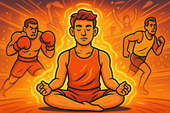
Keeping Calm in Competitive Sports: How to Train Your Mind, Body, and Chemistry for Peak Performance
Competitive pressure can overwhelm even the strongest athletes — but calm is trainable. By combining supplements like magnesium, L-theanine, and adaptogens with breathwork and mindset training, you can stay focused, balanced, and in control under any level of stress 🧠🏅.
-

Supplements for Parents Facing Toddler Tantrums: Staying Calm When Little Emotions Run Wild
Toddler tantrums can drain even the most loving parent — but your calm is powerful. With the right supplements like magnesium, L-theanine, and ashwagandha supporting your nervous system, you can stay patient, grounded, and kind, even when emotions run high 🧸🌿.
-

Workplace Stress and Anger Management Support
Workplace stress can quickly turn into frustration — but calm is a skill you can train. By combining supplements like magnesium, L-theanine, and adaptogens with breathwork and mindset tools, you can stay focused, patient, and emotionally grounded no matter how intense the office gets 💼🌿.
-

How to Stay Patient With Family During Stressful Holidays
Holiday gatherings can stir up old stress and test your patience — but calm is possible. With nervous system support from magnesium, L-theanine, and adaptogens, plus mindful breathing and clear boundaries, you can stay centered, kind, and grounded even when family chaos unfolds 🎄💞.
-
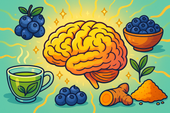
The Role of Antioxidants in Healing Brain Stress from Dissociation
Antioxidants protect the brain from the oxidative stress caused by trauma and dissociation. By neutralizing free radicals and supporting mitochondrial recovery, they help restore clarity, focus, and emotional balance — allowing the mind to heal at the cellular level 🌿🧠.
-
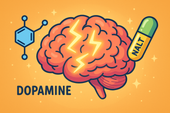
N-Acetyl L-Tyrosine (NALT) for Supporting Mental Clarity
N-Acetyl L-Tyrosine (NALT) fuels dopamine production — the neurotransmitter of focus and motivation. By supporting brain chemistry during stress, NALT helps restore mental clarity, energy, and alertness, making it easier to think clearly and feel present again ⚡🧠.
-

How Ginseng May Improve Focus and Energy in Dissociation
Ginseng helps combat the mental fatigue and fog that often come with dissociation. By supporting mitochondrial energy, balancing neurotransmitters, and regulating cortisol, it gently restores focus, motivation, and emotional presence — helping the mind reconnect with clarity and strength 🌿⚡.
-
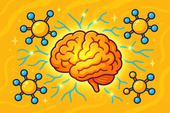
Phosphatidylserine and Dissociation: Supporting Cognitive Function
Phosphatidylserine helps calm the stress response by balancing cortisol, the body’s primary stress hormone. By lowering cortisol spikes, it protects memory, focus, and emotional stability — restoring clarity and mental presence for those struggling with dissociation 🧠🌿.
-
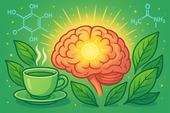
Can Green Tea Extract Help with Dissociative Brain Fog?
Green tea extract may help lift dissociative brain fog by supporting neurotransmitter balance, reducing inflammation, and enhancing energy at the cellular level. With its key compounds EGCG and L-theanine, it promotes calm focus, clarity, and emotional presence — helping you feel more alert and grounded 🍵🧠.
-
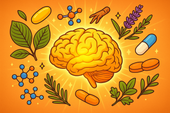
Building a Natural Supplement Stack for Dissociation Support
Building a supplement stack for dissociation means nourishing the brain and body back into communication. By supporting neurotransmitters, gut health, and energy balance through nutrients like magnesium, omega-3s, curcumin, and probiotics, you can help restore clarity, calm, and connection — one layer at a time 🌿🧠.
-

Chamomile and Lavender for Dissociative Anxiety Relief
Chamomile and lavender work together to calm dissociative anxiety by soothing the nervous system and restoring emotional safety. Their natural compounds balance cortisol, enhance GABA activity, and activate the vagus nerve — helping you feel grounded, connected, and at peace again 🌿💜.
-
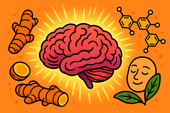
Curcumin for Inflammation and Mental Clarity in Dissociation
Curcumin, the golden compound in turmeric, does more than fight inflammation — it helps clear the mental fog often tied to dissociation. By calming neuroinflammation, balancing neurotransmitters, and supporting mitochondrial energy, curcumin can restore mental clarity, focus, and emotional presence 🌿🧠.
-
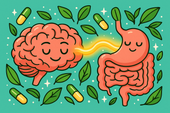
Probiotics and Dissociation: Exploring the Gut–Brain Axis
The gut–brain axis plays a vital role in emotional awareness and presence. When the microbiome is balanced, it supports serotonin production, vagus nerve activity, and calm focus. Probiotics help repair this connection — restoring safety, clarity, and the feeling of truly being in your body again 🌿🧠.
-
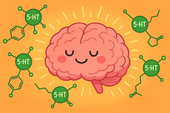
5-HTP for Dissociation: Supporting Serotonin and Emotional Stability
5-HTP helps bridge the gap between emotional numbness and stability by supporting serotonin production — the neurotransmitter that shapes mood, sleep, and sensory awareness. For people experiencing dissociation, 5-HTP may gently restore connection, presence, and emotional balance from the inside out 🌿🧠.
-
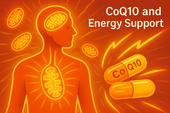
CoQ10 and Energy Support for People with Dissociation
Chronic dissociation often leaves the body running on empty — tired, foggy, and disconnected. CoQ10 helps recharge that system at the cellular level by restoring mitochondrial energy, reducing oxidative stress, and supporting the brain’s capacity to stay present. It’s energy medicine for both body and mind ⚡🧠.

















































